- Home
- Max Brooks
World War Z Page 7
World War Z Read online
Page 7
So you never really tried to solve the problem.
Oh, c’mon. Can you ever “solve” poverty? Can you ever “solve” crime? Can you ever “solve” disease, unemployment, war, or any other societal herpes? Hell no. All you can hope for is to make them manageable enough to allow people to get on with their lives. That’s not cynicism, that’s maturity. You can’t stop the rain. All you can do is just build a roof that you hope won’t leak, or at least won’t leak on the people who are gonna vote for you.
What does that mean?
C’mon …
Seriously. What does that mean?
Fine, whatever, “Mister Smith goes to motherfuckin’ Washington,” it means that, in politics, you focus on the needs of your power base. Keep them happy, and they keep you in office.
Is that why certain outbreaks were neglected?
Jesus, you make it sound like we just forgot about them.
Did local law enforcement request additional support from the federal government?
When have cops not asked for more men, better gear, more training hours, or “community outreach program funds”? Those pussies are almost as bad as soldiers, always whining about never having “what they need,” but do they have to risk their jobs by raising taxes? Do they have to explain to Suburban Peter why they’re fleecing him for Ghetto Paul?
You weren’t worried about public disclosure?
From who?
The press, the media.
The “media”? You mean those networks that are owned by some of the largest corporations in the world, corporations that would have taken a nosedive if another panic hit the stock market? That media?
So you never actually instigated a cover-up?
We didn’t have to; they covered it up themselves. They had as much, or more, to lose than we did. And besides, they’d already gotten their stories the year before when the first cases were reported in America. Then winter came, Phalanx hit the shelves, cases dropped. Maybe they “dissuaded” a few younger crusading reporters, but, in reality, the whole thing was pretty much old news after a few months. It had become “manageable.” People were learning to live with it and they were already hungry for some-thing different. Big news is big business, and you gotta stay fresh if you want to stay successful.
But there were alternative media outlets.
Oh sure, and you know who listens to them? Pansy, overeducated know-it-alls, and you know who listens to them? Nobody! Who’s going to care about some PBS-NPR fringe minority that’s out of touch with the mainstream? The more those elitist eggheads shouted “The Dead Are Walking,” the more most real Americans tuned them out.
So, let me see if I understand your position.
The administration’s position.
The administration’s position, which is that you gave this problem the amount of attention that you thought it deserved.
Right.
Given that at any time, government always has a lot on its plate, and especially at this time because another public scare was the last thing the American people wanted.
Yep.
So you figured that the threat was small enough to be “managed” by both the Alpha teams abroad and some additional law enforcement training at home.
You got it.
Even though you’d received warnings to the contrary, that it could never just be woven into the fabric of public life and that it actually was a global catastrophe in the making.
[Mister Carlson pauses, shoots me an angry look, then heaves a shovelful of “fuel” into his cart.]
Grow up.
Troy, Montana, USA
[This neighborhood is, according to the brochure, the “New Community” for the “New America.” Based on the Israeli “Masada” model, it is clear just from first glance that this neighborhood was built with one goal in mind. The houses all rest on stilts, so high as to afford each a perfect view over the twenty-foot-high, reinforced concrete wall. Each house is accessed by a retractable staircase and can connect to its neighbor by a similarly retractable walkway. The solar cell roofs, the shielded wells, the gardens, lookout towers, and thick, sliding, steel-reinforced gate have all served to make Troy an instant success with its inhabitants, so much so that its developer has already received seven more orders across the continental United States. Troy’s developer, chief architect, and first mayor is Mary Jo Miller.]
Oh yeah, I was worried, I was worried about my car payments and Tim’s business loan. I was worried about that widening crack in the pool and the new nonchlorinated filter that still left an algae film. I was worried about our portfolio, even though my e-broker assured me this was just first-time investor jitters and that it was much more profitable than a standard 40l(k). Aiden needed a math tutor, Jenna needed just the right Jamie Lynn Spears cleats for soccer camp. Tim’s parents were thinking of coming to stay with us for Christmas. My brother was back in rehab. Finley had worms, one of the fish had some kind of fungus growing out of its left eye. These were just some of my worries. I had more than enough to keep me busy.
Did you watch the news?
Yeah, for about five minutes every day: local headlines, sports, celebrity gossip. Why would I want to get depressed by watching TV? I could do that just by stepping on the scale every morning.
What about other sources? Radio?
Morning drive time? That was my Zen hour. After the kids were dropped off, I’d listen to [name withheld for legal reasons]. His jokes helped me get through the day.
What about the Internet?
What about it? For me, it was shopping; for Jenna, it was homework; for Tim, it was… stuff he kept swearing he’d never look at again. The only news I ever saw was what popped up on my AOL welcome page.
At work, there must have been some discussion…
Oh yeah, at first. It was kinda scary, kinda weird, “you know I hear it’s not really rabies” and stuff like that. But then that first winter things died down, remember, and anyway, it was a lot more fun to rehash last night’s episode of Celebrity Fat Camp or totally bitch out whoever wasn’t in the break room at that moment.
One time, around March or April, I came into work and found Mrs. Ruiz clearing out her desk. I thought she was being downsized or maybe outsourced, you know, something I considered a real threat. She explained that it was “them,” that’s how she always referred to it, “them” or “everything that’s happening.” She said that her family’d already sold their house and were buying a cabin up near Fort Yukon, Alaska. I thought that was the stupidest thing I’d ever heard, especially from someone like Inez. She wasn’t one of the ignorant ones, she was a “clean” Mexican. I’m sorry to use that term, but that was how I thought back then, that was who I was.
Did your husband ever show any concern?
No, but the kids did, not verbally, or consciously, I think. Jenna started getting into fights. Aiden wouldn’t go to sleep unless we left the lights on. Little things like that. I don’t think they were exposed to any more information than Tim, or I, but maybe they didn’t have the adult distractions to shut it out.
How did you and your husband respond?
Zoloft and Ritalin SR for Aiden, and Adderall XR for Jenna. It did the trick for a while. The only thing that pissed me off was that our insurance didn’t cover it because the kids were already on Phalanx.
How long had they been on Phalanx?
Since it became available. We were all on Phalanx, “Piece of Phalanx, Peace of Mind.” That was our way of being prepared … and Tim buying a gun. He kept promising to take me to the range to learn how to shoot. “Sunday,” he’d always say, “we’re goin’ this Sunday.” I knew he was full of it. Sundays were reserved for his mistress, that eighteen-footer, twin-engine bitch he seemed to sink all his love into. I didn’t really care. We had our pills, and at least he knew how to use the Glock. It was part of life, like smoke alarms or airbags. Maybe you think about it once in a while, it was always just. . . “just in case.” And besides, really, there wa
s already so much out there to worry about, every month, it seemed, a new nail-biter. How can you keep track of all of it? How do you know which one is really real?
How did you know?
It had just gotten dark. The game was on. Tim was in the BarcaLounger with a Corona. Aiden was on the floor playing with his Ultimate Soldiers. Jenna was in her room doing homework. I was unloading the Maytag so I didn’t hear Finley barking. Well, maybe I did, but I never gave it any thought. Our house was in the community’s last row, right at the foot of the hills. We lived in a quiet, just developed part of North County near San Diego. There was always a rabbit, sometimes a deer, running across the lawn, so Finley was always throwing some kind of a shit fit. I think I glanced at the Post-it to get him one of those citronella bark collars. I’m not sure when the other dogs started barking, or when I heard the car alarm down the street. It was when I heard something that sounded like a gunshot that I went into the den. Tim hadn’t heard anything. He had the volume jacked up too high. I kept telling him he had to get his hearing checked, you just don’t spend your twenties in a speed metal band without . … [sighsl. Aiden’d heard something. He asked me what it was. I was about to say I didn’t know when I saw his eyes go wide. He was looking past me, at the glass sliding door that led to the backyard. I turned just in time to see it shatter.
It was about five foot ten, slumped, narrow shoulders with this puffy, wagging belly. It wasn’t wearing a shirt and its mottled gray flesh was all torn and pockmarked. It smelled like the beach, like rotten kelp and saltwater. Aiden jumped up and ran behind me. Tim was out of the chair, standing between us and that thing. In a split second, it was like all the lies fell away. Tim looked frantically around the room for a weapon just as it grabbed him by the shirt. They fell on the carpet, wrestling. He shouted for us to get in the bedroom, for me to get the gun. We were in the hallway when I heard Jenna scream. I ran to her room, threw open the door. Another one, big, I’d say six and a half feet with giant shoulders and bulging arms. The window was broken and it had Jenna by the hair. She was screaming “Mommy mommy mommy!”
What did you do?
I… I’m not Totally sure. When I try to remember, everything goes by too fast. I had it by the neck. It pulled Jenna toward its open mouth. I squeezed hard… pulled… The kids say I tore the things head off, just ripped it right out with all the flesh and muscle and whatever else hanging in tatters. I don’t think that’s possible. Maybe with all your adrenaline pumping … I think the kids just have built it up in their memories over the years, making me into SheHulk or something. I know I freed Jenna. I remember that, and just a second later, Tim came in the room, with this thick, black goo all over his shirt. He had the gun in one hand and Finley’s leash in the other. He threw me the car keys and told me to get the kids in the Suburban. He ran into the backyard as we headed for the garage. I heard his gun go off as I started the engine.
THE GREAT PANIC
Parnell Air National Guard Base: Memphis, Tennessee, USA
[Gavin Blaire pilots one of the D-17 combat dirigibles that make up the core of America’s Civil Air Patrol. It is a task well suited to him. In civilian life, he piloted a Fujifilm blimp.]
It stretched to the horizon: sedans, trucks, buses, RVs, anything that could drive. I saw tractors, I saw a cement mixer. Seriously, I even saw a flatbed with nothing but a giant sign on it, a billboard advertising a “Gentlemen’s Club.” People were sitting on top of it. People were riding on top of everything, on roofs, in between luggage racks. It reminded me of some old picture of trains in India with people hanging on them like monkeys.
All kinds of crap lined the road-suitcases, boxes, even pieces of expensive furniture. I saw a grand piano, I’m not kidding, just smashed like it was thrown off the top of a truck. There were also a lot of abandoned cars. Some had been pushed over, some were stripped, some looked burned out. I saw a lot of people on foot, walking across the plains or alongside the road. Some were knocking on windows, holding up all kinds of stuff. A few women were exposing themselves. They must have been looking to trade, probably gas. They couldn’t have been looking for rides, they were moving faster than cars. It wouldn’t make sense, but. . . [shrugs].
Backdown the road, about thirty miles, traffic was moving a little better. You’d think the mood would be calmer. It wasn’t. People were flashing their lights, bumping the cars in front of them, getting out and throwing down. I saw a few people lying by the side of the road, barely moving or not at all. People were running past them, carrying stuff, carrying children, or just running, all in the same direction of the traffic. A few miles later, I saw why.
Those creatures were swarming among the cars. Drivers on the outer lanes tried to veer off the road, sticking in the mud, trapping the inner lanes. People couldn’t open their doors. The cars were too tightly packed. I saw those things reach in open windows, pulling people out or pulling themselves in. A lot of drivers were trapped inside. Their doors were shut and, I’m assuming, locked. Their windows were rolled up, it was safety tempered glass. The dead couldn’t get in, but the living couldn’t get out. I saw a few people panic, try to shoot through their windshields, destroying the only protection they had. Stupid. They might have bought themselves a few hours in there, maybe even a chance to escape. Maybe there was no escape, just a quicker end. There was a horse trailer, hitched to a pickup in the center lane. It was rocking crazily back and forth. The horses were still inside.
The swarm continued among the cars, literally eating its way up the stalled lines, all those poor bastards just trying to get away. And that’s what haunts me most about it, they weren’t headed anywhere. This was the I-80, a strip of highway between Lincoln and North Platte. Both places were heavily infested, as well as all those little towns in between. What did they think they were doing? Who organized this exodus? Did anyone? Did people see a line of cars and join them without asking? I tried to imagine what it must have been like, stuck bumper to bumper, crying kids, barking dog, knowing what was coming just a few miles back, and hoping, praying that someone up ahead knows where he’s going.
You ever hear about that experiment an American journalist did in Moscow in the 1970s? He just lined up at some building, nothing special about it, just a random door. Sure enough, someone got in line behind him, then a couple more, and before you knew it, they were backed up around the block. No one asked what the line was for. They just assumed it was worth it. I can’t say if that story was true. Maybe it’s an urban legend, or a cold war myth. Who knows?
Alang, India
[I stand on the shore with Ajay Shah, looking out at the rusting wrecks of once-proud ships. Since the government does not possess the funds to remove them and because both time and the elements have made their steel next to useless, they remain silent memorials to the carnage this beach once witnessed.]
They tell me what happened here was not unusual, all around our world where the ocean meets the land, people trying desperately to board whatever floated for a chance of survival at sea.
I didn’t know what Alang was, even though I’d lived my entire life in nearby Bhavnagar. I was an office manager, a “zippy,” white-collar professional from the day I left university. The only time I’d ever worked with my hands was to punch a keyboard, and not even that since all our software went voice recognition. I knew Alang was a shipyard, that’s why I tried to make for it in the first place. I’d expected to find a construction site cranking out hull after hull to carry us all to safety. I had no idea that it was just the opposite. Alang didn’t build ships, it killed them. Before the war, it was the largest breakers yard in the world. Vessels from all nations were bought by Indian scrap-iron companies, run up on this beach, stripped, cut, and disassembled until not the smallest bolt remained. The several dozen vessels I saw were not fully loaded, fully functional ships, but naked hulks lining up to die.
There were no dry docks, no slipways. Alang was not so much a yard as a long stretch of sand. Standard procedure was
to ram the ships up onto the shore, stranding them like beached whales. I thought my only hope was the half dozen new arrivals that still remained anchored offshore, the ones with skeleton crews and, I hoped, a little bit of fuel left in their bunkers. One of these ships, the Veronique Delmas, was trying to pull one of her beached sisters out to sea. Ropes and chains were haphazardly lashed to the stern of the APL Tulip, a Singapore container ship that had already been partially gutted. I arrived just as the Delmas fired up her engines. I could see the white water churning as she strained against the lines. I could hear some of the weaker ropes snap like gunshots.
The stronger chains though… they held out longer than the hull. Beaching the Tulip must have badly fractured her keel. When the Delmas began to pull, I heard this horrible groan, this creaking screech of metal. The Tulip literally split in two, the bow remaining on shore while the stern was pulled out to sea.
There was nothing anyone could do, the Delmas was already at flank speed, dragging the Tulip’s stern out into deep water where it rolled over and sank within seconds. There must have been at least a thousand people aboard, packing every cabin and passageway and square inch of open deck space. Their cries were muffled by the thunder of escaping air.
Why didn’t the refugees just wait aboard the beached ships, pull up the ladders, make them inaccessible?

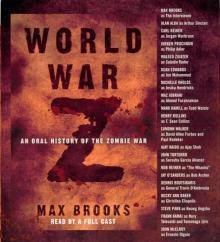 World War Z: An Oral History of the Zombie War
World War Z: An Oral History of the Zombie War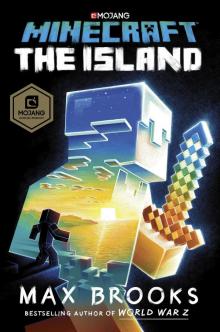 Minecraft: The Island
Minecraft: The Island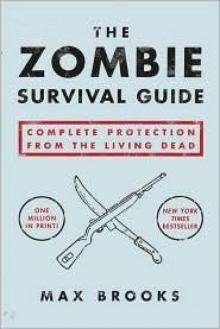 The Zombie Survival Guide: Complete Protection From the Living Dead
The Zombie Survival Guide: Complete Protection From the Living Dead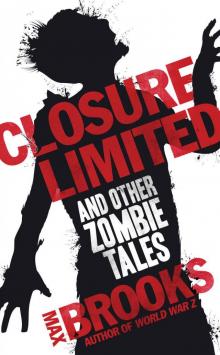 Closure, Limited and Other Zombie Stories
Closure, Limited and Other Zombie Stories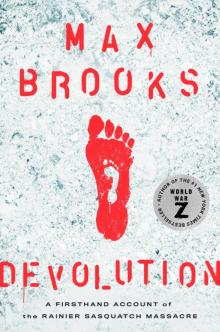 Devolution: A Firsthand Account of the Rainier Sasquatch Massacre
Devolution: A Firsthand Account of the Rainier Sasquatch Massacre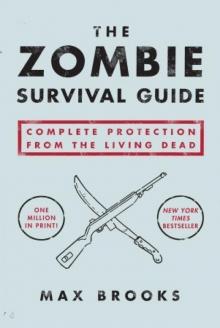 The Zombie Survival Guide
The Zombie Survival Guide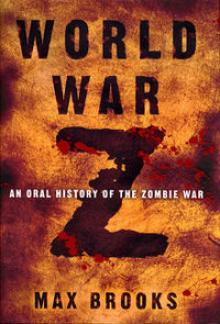 World War Z
World War Z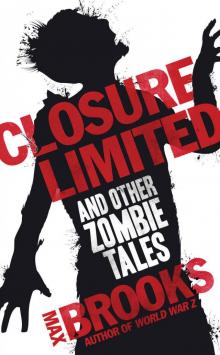 Closure, Limited
Closure, Limited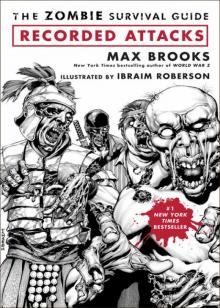 The Zombie Survival Guide: Recorded Attacks
The Zombie Survival Guide: Recorded Attacks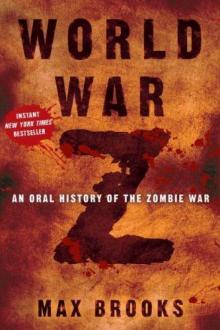 World War Z_An Oral History of the Zombie War
World War Z_An Oral History of the Zombie War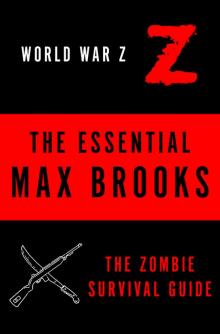 The Essential Max Brooks: The Zombie Survival Guide and World War Z
The Essential Max Brooks: The Zombie Survival Guide and World War Z